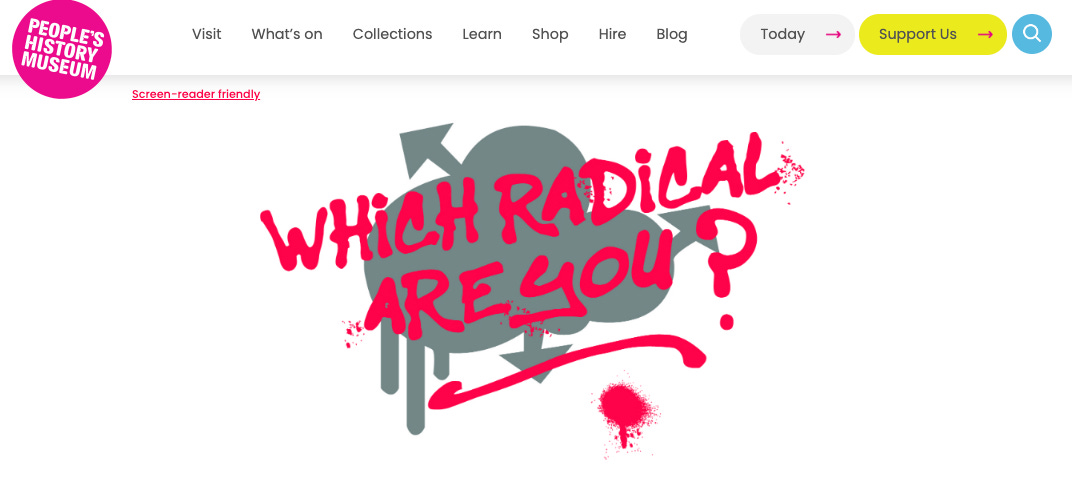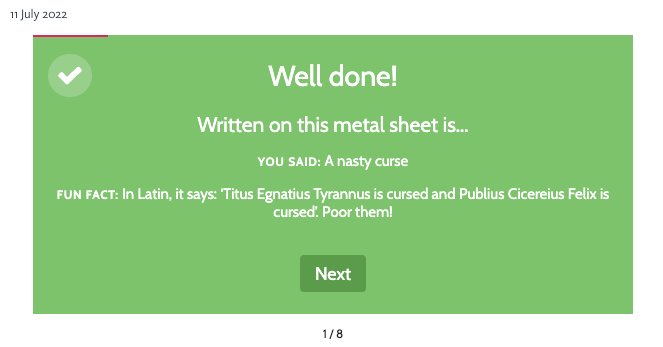Cultural content: quizzes
Hello team Cultural Content,
Today I’ll be looking at quizzes.
Yes, that’s right, I took time out of my day to play on online quizzes for this newsletter. It’s a hard life.
Quizzes can feel a bit silly – a bit peripheral to the kinds of content a cultural organisation ‘should’ be creating. Generally when you’re filling one out, you’re probably supposed to be doing something else.
But from the point of view of the content creator, they’re GOLD.
Partly because the Internet is predicated on stopping you from doing what you should be doing and eating up hours of your time doing something quite silly and peripheral instead.
We’re doing a search engine optimisation project for a museum at the moment. As part of that, we're using various tools to identify the terms people use to search for topics relevant to the museum’s core themes. Turns out there are a lot of people online searching for ‘[[topic]] quizzes’.
But quizzes can also be strategic and important, and help deliver against against cultural organisation’s wider educational mission too.
Personality quizzes
I love a good personality quiz, although I mainly remember doing them as teenager in gossip magazines (which EastEnders character are you? etc), and don’t seem to have picked up the habit online. It seems I’m in the minority here though as people search, share, and enjoy having a laugh over personality quizzes. After all, that is how Cambridge Analytica managed to hack vast amounts of Facebook data, through a self reported personality quiz spread on the platform. Anyway…
Royal Academy: which Abstract Expressionist are you?
Full kudos to fellow One Further Content Strategist Louise Cohen for this one. Louise deliberately introduced online quizzes, first at Tate, and later at Royal Academy (including this one). She saw how successful they were editorially at The Times (where she worked before joining the sector).
People’s History Museum: Which Radical Are You?
Built using Snap Surveys
Interestingly, People’s History Museum have made this quiz the gateway to their newsletter sign up, so you get emails based on your quiz results/ which radical you are.
A lot of the questions are the same questions Morris Hargreaves MacIntyre use to determine which Culture Segment you are, and send you targeted mail as a result. And indeed the privacy disclaimer confirms MHM have designed this form. Interestingly on Culture Segments quiz on MHM’s website you don’t get the result without providing an email, but PHM lets you have your radical fun without having to join the newsletter. I do wonder about their enews conversion rate though… given that there’s no way to sign up to the newsletter without doing the quiz.
But mainly, for the purposes of this post, it’s a fun quiz.
Both personality quizzes are clever from an SEO point of view (people like quizzes and search for them). They’re also clever for combining the subject matter/mission of the museum into something that’s both personal and shareable (people like telling other people which abstract expressionist artist/radical they are). *Cough: Joan Mitchell / Mary Wollstonecraft*.
Subject matter quizzes
Subject matter quizzes are somewhat more common and (arguably) straightforward to create than personality ones, and there are some great web-based ones across the sector.
London Transport Museum: How much do you know about the Elizabeth line?
Today I learned that I, in fact, know very little about the Elizabeth line.
Museum of London: Guess the Roman mystery object
Built using TryInteractive
This nice little quiz is less about your general knowledge of the subject area, and more about trying to get you to look at the Roman objects, make an informed guess, and learn as you go. It’s the only one of the quizzes I’ve looked at today that gives you feedback per question, which – pedagogically – makes sense (I still know very little about the Elizabeth line, for instance – not that I’m bitter).
National Theatre: At Home Quiz with Ian McKellan, Helen Mirren, Lenny Henry and Lesely Manville
National Theatre did their own version of an online quiz in lockdown. As with a lot of their social content, they’ve elevated it by adding celebrities and a well formulated donation message that speaks to their mission and vision (and in this instance; the financial pressure they were under as a result of the first UK lockdown). It’s nicely done.
This was conceived as a live event. But since video is becoming an increasingly important part of Search Engine Results Page elements, the retrospective search potential of a YouTube quiz like this is quite substantial. There’s also something oddly nostalgic now about seeing celebrities ‘at home’.
That’s it for this week. Please let me know which radical / expressionist artist you are, or if this post has prompted any thoughts/ comments.
Have a great week.
Georgina
Georgina@onefurther.com









